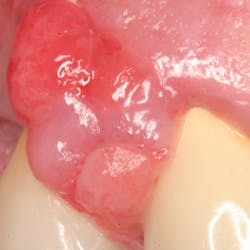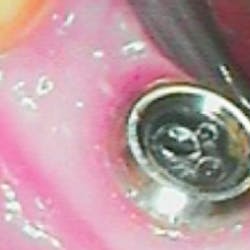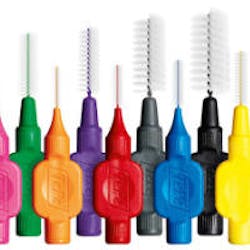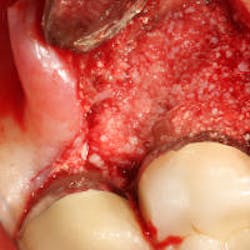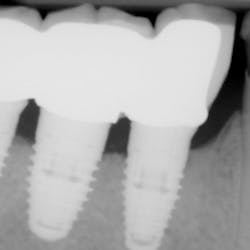By Maureen Tsokris, RDH, EdD
Managing a patient’s dental implant maintenance requires a team effort to ensure long-term success. As part of the dental team, the dental hygienist plays a key role in dental implant maintenance. A complete assessment of the patient’s dental implants should be conducted at each recare appointment.
During each recare appointment, visual assessment of the patient should include examining the patient for signs of inflammation, bleeding, changes in probing depths, mobility, or exudate around the implant(s). In addition, it is important that implants are evaluated radiographically to determine whether changes have occurred in bone levels. A careful review of the patient’s current medications, as well as a review of his or her health status, is an important consideration in the assessment process.
Due to the nature of the tissue attachment surrounding the implant, dental implants may be more susceptible to inflammation and bone loss when plaque accumulates. Proper maintenance of the patient’s tissues will ensure longevity of the implant. A patient’s home-care routine can significantly influence implant success. It is important that once the assessment is completed, a patient-specific home-care routine is developed for each implant patient.
Proper instrument selection is essential in order to prevent damage to the surface of the implant and trauma to the patient’s tissues. Using stainless steel or graphite instruments on titanium implants can cause pits and scratches on the implant surface. These pits and scratches promote the adherence of plaque and calculus on the surface of the implant abutment. Greater plaque accumulations on implants can create an inflammatory reaction in the soft tissues. This reversible inflammatory response, known as peri-implant mucositis, is similar to gingivitis and can lead to bone loss. Plastic scalers, titanium scalers, and ultrasonic instruments covered with a carbon composite or plastic tip are commercially available for instrumenting around dental implants.
It has been suggested in the dental hygiene literature that the practitioner consider scaling implants prior to scaling the patient’s natural teeth. The rationale behind this recommendation is that by scaling the implant first, the clinician is able to prevent the bacteria from the natural teeth from being deposited into the sulcus of the implant.
When the gingival tissues surrounding the implant are healthy, the only treatment necessary is debridement of the patient’s dental prosthesis; this can be completed with a plastic curette. In cases where the patient presents with either soft-tissue recession or pocketing, the patient's prosthesis may be cleaned with either standard metal instruments or an ultrasonic instrument. Plastic scalers and or plastic-tipped ultrasonic instruments should be used to debride the exposed supra- or subgingival surfaces of the implant. Newer implant systems have eliminated the smooth polished collar at the most coronal portion of the implant. These newer implants are being manufactured with a roughened collar. Recent evidence indicates that the use of metal instruments on these newer implants may, in fact, reduce the surface roughness of the implant, making them less plaque-retentive. However, further research in this area is needed before any changes are made to the current methods of implant care.
As more and more implants are placed, the dental team will encounter great variations in patient needs and potential complications. It is imperative that all members of the dental team are equipped to provide proper assessment and maintenance of dental implants.
Author bio
Maureen Tsokris, RDH, EdD, is a full-time assistant professor and assistant chair of the dental hygiene program at Farmingdale State College, Farmingdale, N.Y. She has practiced clinical dental hygiene for more than 20 years. Her experience includes working with pediatric patients, the geriatric population, psychiatric patients, as well as the general public. In addition to her responsibilities as a full-time faculty member and clinical instructor, Dr. Tsokris also teaches several courses in the online bachelor's degree completion program, including Research for the Health Sciences, Gerontology and Special Needs Patients, and the capstone course, the Dental Hygiene Practicum. She is a member of Sigma Phi Alpha, the National Dental Hygiene Honor Society.
Latest in Hygiene Techniques
Latest in Hygiene Techniques


